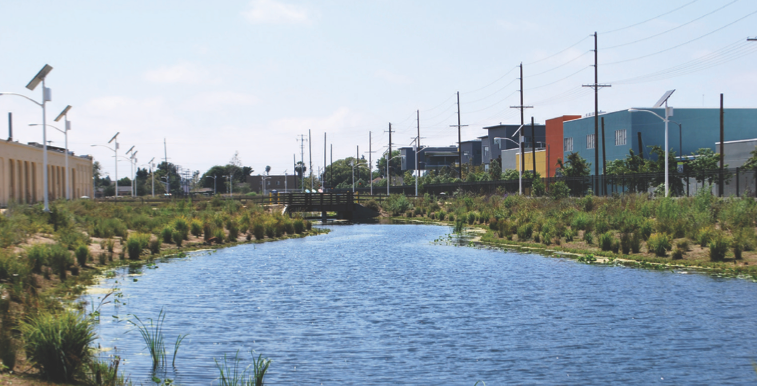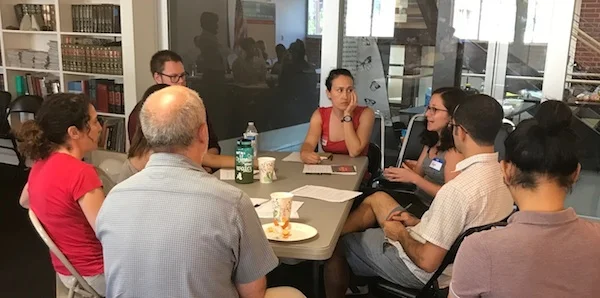This measure would repeal the Costa-Hawkins Rental Housing Act (passed by the state legislature in 1995) and as a result, make it possible for California cities to strengthen rent control. Rent control laws determine when, why, and by how much a landlord can increase rent, in order to prevent displacement of tenants and to prevent housing costs from leading to financial crisis and even homelessness. These policies also provide protections from arbitrary eviction and large payments if a tenant is evicted in order for the building to be torn down or converted to condos.
In the City of Los Angeles, the Rent Stabilization Ordinance (RSO) limits annual rent increases to the approximately the amount of inflation (usually around 3%) for renters in multi-unit buildings constructed before 1979.
The problem with Costa Hawkins is that it severely restricts cities and counties’ authority to enact, amend, and expand rent control laws. Currently, the law:
Makes it impossible for cities and counties to control rents on anything built after 1995 or the date in which a city’s rent control was initially put into effect.
Mandates “vacancy de-control,” which means that landlords have the right to raise the rent to whatever they want once a tenant leaves, something that encourages harassment against tenants in “hot” neighborhoods.
Bars any form of rent control on single family properties.
This last point is is especially significant in Los Angeles, where working-class families rent out tens of thousands of single-family homes, many of which have been acquired by Wall Street giants like Blackstone (aka “Invitation Homes”) in the wake of the 2008 foreclosure that Wall Street caused in the first place.
There’s been a housing crisis for poor and working people for decades, but it’s accelerated over the last several years and is impacting people higher and higher up the income scale. Repealing Costa-Hawkins will give cities and counties a powerful tool to keep people in their homes as rental prices skyrocket. Repealing Costa Hawkins would not create rent control. But it enables cities to consider enacting and expanding rent control and go through their own, local legislative process.
Rent control policies have been shown to be very effective at reducing displacement and helping tenants remain in their homes in the face of cost pressures from booming rental costs citywide as well as gentrification of previously poor and working class areas. It would be an especially valuable tool to cities that are rapidly gentrifying and have no rent control, such as Inglewood, Long Beach, and Pasadena.
Some cities with rent control ordinances badly need to update their policies — in Los Angeles County, the cities of Los Angeles, West Hollywood, Beverly Hills, and Santa Monica have rent control on some properties, but not on properties built in the last three decades or single family homes. In the City of Los Angeles, single family properties have been a boom for corporate and Wall Street landlords, but are increasingly unaffordable for long-time residents of gentrifying parts of South LA, Boyle Heights, and Highland Park. Yet, the city cannot extend any form of rent control to these properties because of the Costa Hawkins Act.
Opponents of rent control policies typically argue that rent control increases housing costs by raising rents and curtailing housing production. These arguments are overblown. Empirical findings on these questions are mixed. Some studies have found rent control policies that slow down housing production, but others have found little effect. A Stanford economics study made big headlines early this year for its finding that rent control in San Francisco led to higher rents for residents of non-rent controlled housing. But the increase in rent that the study attributed to rent control only accounted for a very small fraction of San Francisco’s astronomical rise in rents, with other factors accounting for the vast bulk of the increase in rents. Moreover, the study also found that San Francisco’s policy created very notable benefits for tenants of rent-controlled units and made them much less vulnerable to displacement.
There’s little doubt that a badly designed rent control ordinance can have ill effects in reducing private investment in housing construction or maintenance — but a well-designed one can hugely benefit vulnerable renters who are struggling to survive in a housing market that radically tilts the scales of power towards homeowners and landlords. Repealing Costa Hawkins would be a small but crucial step to giving renters a greater voice in local housing policy debates and allowing cities to tailor policies to their own local conditions.
The other main argument against Prop 10 is that this kind of change should be done through the legislature. That would make sense if powerful interests like the California Apartment Association and corporate developers hadn’t given so much money to legislators that a bill to repeal even parts of Costa Hawkins can’t get passed though a single committee. When opponents say Prop 10 is a bad idea because the repeal of Costa Hawkins needs to be fined tuned, it is unlikely they supported or put much work into repealing it through the legislature.
The initiative’s biggest opponents are the California GOP, the California Apartment Association, and the California Rental Housing Association. Private equity firms such as Blackstone, which own rental properties across California, have contributed handsomely to the No on 10 effort. The California NAACP is opposing it, but its president, Alice Huffman, is being paid $25,000 a month by the campaign. Likewise, the president of California Community Builders, John Gamboa, is vocally opposing Prop 10, but his organization is heavily funded by big banks like Wells Fargo and JPMorgan Chase.
Supporters include dozens of community, tenants rights, and social justice groups, as well as the California Democratic Party, LA City Mayor Eric Garcetti, LA City Councilmember Mike Bonin, and other local elected officials.
We encourage voters to support Prop 10 and give local communities one more tool to address the housing and homelessness crises.
SUPPORTERS
Affordable housing developers such as East LA Community Corporation, Esperanza Community Housing Corporation, Non-Profit Housing Association of Northern California (NPH), Southern California Association of Non-Profit Housing (SCANPH), Thai Community Development Center, TRUST South LA, Venice Community Housing Corporation, Women Organizing Resources Knowledge and Services (WORKS), and Affordable Housing Alliance.
Tenants organizations like Tenants Together, Affordable Homeless Housing Alternatives, Anti-Eviction Mapping Project, California Coalitionfor Rural Housing, Chinatown Community for Equitable Development, Coalition for Economic Survival, Hunger Action Coalition Los Angeles, Inquilinos Unidos, Los Angeles Tenants Union, San Francisco Anti-Displacement Coalition, San Francisco Tenants Union, Strategic Actions for a Just Economy (SAJE), United Neighbors In Defense Against Displacement (UNIDAD), Uplift Inglewood.
Legal and policy advocates like the ACLU of California, ACLU of Southern California, Advancing Justice – Asian Law Caucus, California Rural Legal Assistance Foundation, Center for Community Action & Environmental Justice, Eviction Defense Network, Inner City Law Center (LA), LA Center for Community Law & Action, Law Foundation of Silicon Valley, National Lawyers Guild – LA, Public Advocates, Public Counsel, Public Interest Law Project, Western Center on Law and Poverty, and Housing California.
Social justice groups like the Alliance for Community Transit – Los Angeles (ACT-LA), Alliance of Californians for Community Empowerment (ACCE Action), Asian Pacific Environmental Network (APEN), California Partnership, Consumer Watchdog, Courage Campaign, DSA, League of Women Voters of California, Liberty Hill Foundation, Pasadenans Organizing for Progress, PolicyLink, Richmond Progressive Alliance, and Silicon Valley De-Bug.
Racial justice groups like API Equality – LA, American Indian Movement Southern California, Coalition for Humane Immigrant Rights Los Angeles (CHIRLA), Dellums Institute for Social Justice, Fannie Lou Hammer Institute, Latino Equality Alliance, Los Angeles Urban League, MLK Coalition of Greater LA, Black Women for Wellness, and Latino Health Access.
Labor groups like California Labor Federation, AFSCME, California Nurses Association, California Teachers Association, Central Coast Alliance United For A Sustainable Economy, Koreatown Immigrant Workers Alliance, Los Angeles Alliance for a New Economy, Los Angeles Black Worker Center, Oakland Education Association (OEA), National Union of Healthcare Workers, SEIU California, UFCW Local 770, Unite HERE Local 11, Warehouse Worker Resource Center.
Political groups like Indivisible California, League of Women Voters, California Democratic Party, Los Angeles County Democratic Party, Harvey Milk LGBT Democratic Club, and dozens of Democratic Clubs across the state.
Senior groups like California Alliance for Retired Americans Senior and Disability Action.
Religious/faith groups like Bend the Arc: A Jewish Partnership for Justice, Clergy & Laity United for Economic Justice (CLUE), Congregations Organized for Prophetic Engagement (COPE), LA Voice, PICO California, Sojourner Truth Presbyterian Church, and Unitarian Universalist Faith in Action Committee.
Education groups like InnerCity Struggle and University of California Student Association. Newspapers like Los Angeles Times and Sacramento Bee.
OPPONENTS
Blackstone, Wall Street firm that is also largest landlord of single-family homes, through its subsidiary “Invitation Homes.”
Billionaire conservative developers & Trump supporters Geoffrey Palmer and Sam Zell
Developers like AMCAL Multi-Housing, BRIDGE Housing, GTM Holdings, Highridge Costa Housing Partners, JH Stark Companies, TELACU, The Pacific Companies, and USA Properties Fund, Inc.
Labor groups like State Building and Construction Trades Council of California and Los Angeles/Orange Counties Building & Construction Trades Council
Business groups like California Chamber of Commerce, California Building Industry Association, National Association of Home Builders, Central City Association of Los Angeles, California Apartment Association (landlords), regional and ethnic chambers of commerce
California State Conference of the NAACP.
Newspapers like the San Francisco Chronicle.
For detailed analysis and recommendations all the other California and Los Angeles propositions, download our voter guide at https://LosAngelesForward.org/ballot/
Want to take action to support Prop 10?
There are tons of opportunities to talk with voters on the phone and door-to-door.
Check ‘em out at https://www.prop10fortenants.com/greater_los_angeles
You can also make a difference by texting renters and getting them to mark their ballots for Prop 10! It's super easy, it's anonymous, and you can do it whenever you have a few minutes to spare on your computer.
Learn more and sign up at https://resistancelabs.com/prop10/#text























